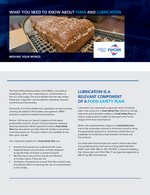From Farm to Table: Safety & Sustainability Improvements in Food-Grade Lubrication
When it comes to the food we put into our body, safety and sustainability is becoming more important to consumers. From farm to table, each step in food processing must meet stringent requirements to protect both consumers and the environment. We sat down with Mohit Bhatia, our Product Manager for food-grade and other specialty lubricants, to learn more about how FUCHS is helping food manufacturers meet these requirements.

How has the Food Safety Modernization Act (FSMA) changed the way companies source their lubricants?
The Food Safety Modernization Act (FSMA) has significantly impacted the way companies source their lubricants. FSMA is focused on preventing contamination in the U.S. food supply. As part of the preventive measures, food manufacturers are required to create a Food Safety Plan that documents and describes the facility’s preventive controls procedures. Lubrication is an important component which should be considered in a Food Safety Plan. Failure to include lubricants and lubrication safety in a Food Safety Plan can lead to costly product recalls and damage the brand image of the food manufacturer.
One of the preventive controls to minimize hazards is using the appropriate lubricant on machinery where there is a possibility of any incidental contact between the food and lubricant. It is imperative that the lubricant used in these areas meets the guidelines set by the Food and Drug Administration (FDA) under FDA Title 21 CFR 178.3570. The lubricants meeting the criteria laid out in FDA Title 21 are typically registered as NSF H1 by NSF International.
How does FUCHS help customers comply with the FSMA?
There are various ways FUCHS helps food manufacturers to prepare their lubrication program to develop and meet the lubrication part of Food Safety plan. Some of the key services offered by FUCHS to food manufacturers are:
- A detailed Lubrication Critical Control Point (LCCP) survey to evaluate lubrication hazards that could affect food safety
- Help with optimizing and / or consolidation of lubricants to minimize risk
- Guidance on lubricant storage, application and disposal
- Bringing best practices on lubrication 6S
- Training for supervisors and employees on lubrication and food safe
What can lubricant manufacturers do to help customers operate more sustainably?
Sustainability is about the safety of people and our environment. FUCHS helps protect consumer safety by staying abreast of chemical regulations and making sure our food-grade products remain compliant with the latest food-safety requirements. To protect our environment we help customers reduce waste and reduce friction which can lower their energy usage and CO2 output.
What are Mineral Oil Saturated Hydrocarbons (MOSH) and Mineral Oil Aromatic Hydrocarbons (MOAH) and what risk do they pose to food manufacturers?
The MOSH-value describes the amount of saturated mineral oil-based hydrocarbons, the MOAH-value describes the amount of aromatic mineral oil-based hydrocarbons. Per a study published by European Food Safety Authority (EFSA) on their website they concluded: “Our experts concluded that MOSH do not pose a risk to public health at the current levels of exposure. One type of MOAH may contain genotoxic substances that can damage DNA in cells and may cause cancer. For substances such as these, a safe level cannot be established.”
For food manufacturers, the presence of MOSH and MOAH in food products can lead to potential health risks for consumers and regulatory compliance issues. Therefore, it’s crucial for food manufacturers to implement measures to minimize the risk of MOSH and MOAH contamination in their products.
The food-grade lubricants produced by FUCHS are generally divided into two product groups. On the one hand, the CASSIDA products are based on fully synthetic base oils and are, by definition, free from mineral oils and related substances. The CASSIDA FM products are based on carefully selected white mineral oils. Therefore, they show up with a certain MOSH content. None of the CASSIDA and CASSIDA FM products contain any bi- or polynuclear aromatic hydrocarbons (MOAH). The CASSIDA and CASSIDA FM products are developed for use in the food industry. Therefore, they are all registered as H1 lubricants by NSF International, which implies the use of FDA listed raw materials only, and therefore provide the highest food safety standard for the end user.
What sets FUCHS apart from other lubrication solution providers?
FUCHS sets itself apart from other lubrication solution providers through its comprehensive portfolio of food-grade lubricants, encompassing both white mineral oil and synthetic products. Our food-grade lubricants are designed to cater to a diverse range of applications within a food processing facility.
Not only do our FUCHS CASSIDA and FM product lines hold NSF H1 registration, but they are also Kosher and Halal certified. They are available in a variety of packaging options, from bulk quantities all the way to cartridges and smaller packs, to suit different customer needs. Manufactured in an ISO 21469 certified facility, these products are backed by a team of highly trained professionals, dedicated to providing on-site customer support.
Furthermore, FUCHS ensures that their support extends beyond just product provision - we are committed to delivering technology that provides tangible returns, enhancing operational efficiency and productivity for our customers.

